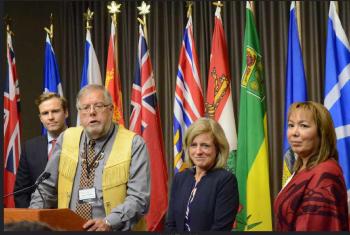Image Caption
Summary
By Paula E. Kirman
Windspeaker.com Contributor
EDMONTON
Alberta’s Premier Rachel Notley said the meeting with Indigenous leaders on July 17, as a lead up to the Council of the Federation, was an “honour and “privilege,” and that the conversation between will help “build a more hopeful and promising future.”
“We are steadfast in our resolve in making progress on issues that are critically important to Indigenous people,” she said in a media conference following the meeting.
“We've made it a priority to work in collaboration with Indigenous communities and organizations on practical issues that would improve their lives day in and day out.”
The Council of the Federation is an annual summit of provincial and territorial premiers, held in a different province each year. There is usually a set aside day to engage Indigenous leaders from national organizations.
However, three major Indigenous groups boycotted the meeting, at which 11 of Canada’s 13 premiers were in attendance, claiming that having a separate meeting with Indigenous leaders does not provide the opportunity to be have meaningful involvement.
The Assembly of First Nations, Métis National Council, and Inuit Tapirit Kanatami held a press conference on July 17 in Toronto.
“The premiers understand the important role of the national Indigenous leadership who are not able to be here today and we also understand that there are a number of issues going forward and we are interested in having meetings in the future,” Notley said prior to the meeting.
“We were certainly looking forward to having conversations about the very issues that they raise today, but we certainly look forward to hopefully having the opportunity to meet with them in the future.”
“There are a number of complex issues involving relationships between Indigenous people and other orders of government in Canada and they require conversation. You won't get to resolution without having those conversations.”
Some of the issues discussed included children in care, issues pertaining to socio-economic status, and the missing and murdered Indigenous Women and Girls inquiry.
“Speaking for CAP, (Congress of Aboriginal Peoples), I can assure you it was well worth our while to be present here, mainly for having connections with all the premiers. This was, in the future, if there are problems, we can pick up the phone and discuss it with either the premier or a person who would be able to help us,” said Robert Bertrand, CAP national chief.
“I don't want to speak for the other three organizations,” he said, when asked what he thought of the organizations who did not attend.
“I was very happy to be here. We had good communication with the premiers. As for the other organizations, it's too bad they decided not to come and they have their reasons for doing so and I respect it.”
Francyne Joe, president of the Native Women's Association of Canada, also chose to attend. The NWAC membership expects her to speak about “issues affecting our women at every opportunity.”
She added that support of Cindy Blackstock, activist for child welfare, was needed with regard to the issue of First Nations children in care.
As for the Assembly of First Nations' assertions that Indigenous groups should be equals at the table, New Brunswick Premier Brian Gallant stated that “it’s really important to do everything we can as premiers in the provinces and territories to consult and engage with First Nations and Indigenous peoples. That's why for years we’ve had the five organizations come join us at the table to discuss what challenges and opportunities they have before them. I believe we have really seen some positive results because of that engagement and consultations.”
Gallant said it’s the results that matter.
“I think it is important for us to do whatever we can do to do as much consultation and engagement with the goal of achieving results. We're trying to advance educational opportunities, advance healthcare, and grow the economy in a way that everybody can participate, including Indigenous people and communities.
“For us, we want to make sure we do whatever we can to achieve real results and not just be in this continual cycle discussing process. Process can be very important, but it’s only important if we’re all trying to achieve results that improve the quality of life of First Nations and Indigenous people.”
The Council of the Federation continues to meet this week. Topics include NAFTA, healthcare, and the economy.

